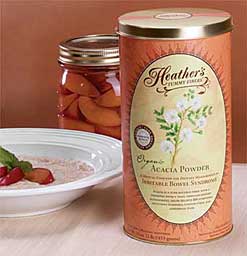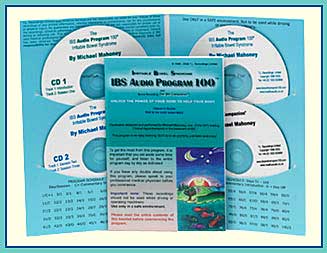| |
 |

Peppermint Oil Capsules
Now with 50% More Enteric Coating!
Called "Drug of Choice for IBS"
For IBS patients with constipation or diarrhea, to alleviate general symptoms, and to improve quality of life
In this Issue...
Food & Recipes
Special Events
Special Letters
Rx News & Research
Ask Heather
In the Next Issue...
* IBS Patient Symposium
* What makes one reader smile about IBS?
* More new stores!
Did you miss the latest
IBS newsletter and
Special Mind-Body Issue?
Find out what helps IBS when nothing else does!
|
 |
|
| |
Heather's IBS Newsletter ~ For Irritable Bowel Syndrome
June 27, 2006
A Grateful Reader Makes a Very Special Gift to You!
Hello to everyone -
This week's newsletter ranges from grateful readers to acupuncture to ghosts! How are they all connected to IBS? Keep reading and you'll soon find out!
We also have a delicate tea cake recipe that makes the most of IBS-helpful ingredients, for a perfect sweet treat on a warm summer day.
Finally, we have new stores that have added Heather's Tummy Care products, and as always we have the latest IBS news and research. Enjoy!
Best Wishes,
Heather Van Vorous
Did a friend send you this newsletter? Sign up here for your own free subscription. 
Lavender Lime Tea Cake This moist, delicate cake is especially delicious with a cup of Fennel Tummy Tea. For an extra-special treat, add any leftover lavender flowers to your teacup with the fennel, for a wonderful flavor combination. Lavender is known to have a soothing, relaxing effect on the nervous system and is very helpful for anxiety and stress-related IBS symptoms. So, you can have your cake and eat it too!
Makes one 10" bundt cake OR one 9 x 5" loaf, 16 slices per cake
3/4 cup soy/rice milk
2 teaspoons apple cider vinegar
2 cups all-purpose unbleached white flour
1 T Acacia Tummy Fiber
1 1/2 teaspoons baking powder
1/2 teaspoon salt
1 1/2 cups granulated sugar
1/3 cup canola or safflower oil
4 organic egg whites
Zest from 2 limes (use a cheese grater to remove just the green skin, not the white pith)
Glaze:
1/2 cup strained fresh lime juice (from 3-4 limes)
5 tablespoons granulated sugar, divided
2 T dried lavender blossoms
Make glaze: stir lime juice, 4 tablespoons sugar, and lavender together in a small saucepan. Bring to a boil and immediately reduce heat to a low simmer. Simmer till slightly reduced, about 2-3 minutes. Remove from heat, stir in remaining 1 tablespoon sugar, and cool. Strain syrup to remove lavender, pressing hard on solids.
Preheat oven to 350 F. In a medium bowl add vinegar to soy milk and stir well; set aside. Sift dry ingredients into large bowl. Whisk well to combine. Add to soured soy milk the oil, egg whites, and zest. Whisk well until thoroughly combined. Add wet ingredients to dry with a few swift strokes by hand just until blended. Pour batter into a non-stick loaf pan sprayed with cooking oil. Bake for about 50-60 minutes or until a toothpick or cake tester inserted into the center of the loaf comes out clean.
When bread is done, and while it is still hot from the oven, run a knife around the edges of the pan to loosen the loaf, and prick bread carefully all over with a thin wooden or metal skewer. Pour glaze over bread, and cool in pan on rack.
This bread received Will's highest approval rating - and he is fussy!
For a truly special treat, serve this tea cake as a delicate dessert with our delectable recipe for Greek Shrimp Shish Kebabs.
Are you just learning how to eat for IBS? Not quite sure what makes these recipes special in the first place? Don't worry! Find the answers to all your questions with Heather's IBS Diet Kit.
  
Organic Fennel & Peppermint Tummy Tea Bags
Fennel is terrific for bloating & gas, Peppermint is great for IBS pain & spasms.

New Retail Stores Carrying Heather's Tummy Care Products
We're continuing our special rebate offer for people who buy Tummy Care products at their local stores, and we have new store announcements this week as well!
California
A Natural Balance
Jenny Dull, Licensed Acupuncturist
260-A Station Way
Arroyo Grande, CA 93420
805-481-3442
Please call for hours and availability
Nature's Pantry
6008-D CLARK ROAD
PARADISE, CA 95969
530-872-0549
Oregon
Bear Creek Naturopathic Clinic
1603 E Barnett Road
Medford, OR 97504
541-770-5563
Market of Choice
25 West 25th Avenue
Eugene, OR 97405
541-510-0870
If you don't have a store in your area carrying Tummy Care products yet, please give them this flyer to ask them.
New Stores That May Add Tummy Care Products
We have quite a long list of stores (and we update the list each week) that have expressed interest in carrying our products, have asked for samples and information, but have not yet ordered. To see if one of these stores is in your area, please check our list of potential stores and practitioners. If someone on the list is near your location please let them know you'd like them to add the Tummy Care line for you.
Now with 50% More Enteric Coating!
~ Heather's Tummy Tamers ~
For the Dietary Management of Abdominal Pain &, Bloating

Peppermint Oil Caps with Fennel and Ginger Are Amazing!
Because our Peppermint Oil Caps have the added benefits of fennel and ginger oils, they are truly unbeatable for preventing abdominal pain, gas, and bloating!
 A Grateful Yoga Teacher Makes a Very Special Gift
A Grateful Yoga Teacher Makes a Very Special Gift
Dear Heather,
Thank you for your website and all your products and free information. The Fennel Tummy Tea and Acacia Tummy Fiber, especially, have changed my life. I have suffered from IBS-A (alternating between constipation and diarrhea) for nearly 10 years, and (as I'm sure you can imagine) though I had slowly been discovering how to calm my intestines on my own, I've also been given a lot of bad advice (psyllium husks! ack!).
In my Life Before Acacia, the one thing that I could always count on to calm things down was yoga. It's become such an important part of my life that I recently decided to become a teacher.
You and this community have done so much to help me, and I want to give back. I know how embarassing it can be to go to a studio full of people, with our bodies' smells, noises, and urgencies. Yet I feel that the personal instruction and pose modification we get from teachers is very important when starting a yoga practice.
So I'd like to help people with IBS (C, D or A) get started with their own home practice by offering two free private yoga classes to anyone with IBS who hears about me through you. The classes will be in the San Francisco Bay Area.
What's the best way to make people aware of this? People may contact me at my email address: maile.mccarthy "at" gmail.com.
Thanks again, and I look forward to hearing from you.
Maile McCarthy
San Francisco, CA
Thank you so much for such a wonderful letter and offer, Maile! I am sure you will hear from many folks who would love to begin yoga but have been afraid to take a class. I hope this letter inspires them to give yoga a try - it truly is so wonderful for IBS. Thank you again for your generosity! ~ Heather
Did you miss the last reader letter? Find it here...
~ Heather's Tummy Fiber ~
For the Dietary Management of Abdominal Pain, Diarrhea, &, Constipation

Organic Acacia ~ Pure Soluble Fiber
The prebiotic fiber that relieves both diarrhea and constipation!
 Healthcare-Seeking Behaviour in IBS
Healthcare-Seeking Behaviour in IBS
A recent study in Alimentary Pharmacology & Therapeutics found differences in males and females regarding specific factors motivating healthcare-seeking behaviour, but results in both sexes are consistent with the finding that the presence of medical conditions in addition to IBS is associated with seeking health care for IBS symptoms. Females suffering from dyspepsia and pelvic pain, for example, were more likely to seek health care for IBS than subjects without these comorbid conditions. While abdominal pain or discomfort was the most common reason for seeking care among the healthcare seekers in this study, the severity of abdominal pain was not significantly different between the healthcare seekers and those that did not seek health care for their IBS.
While they did not find an association with mental illness, they did find that the extent to which the subjects' IBS affected their physical and social functioning, as reflected in their quality of life scores, was important in distinguishing between those subjects that sought medical care for their IBS symptoms and those that did not. Greater interference of gastrointestinal symptoms with work and activities and reduced IBS-specific quality of life have previously been identified as predictors of health care use among IBS subjects. In this study, quality of life issues had a greater impact on the healthcare-seeking behaviour of males than that of females.
In conclusion, they found that healthcare-seeking behaviour among IBS subjects were determined by the presence of comorbid medical conditions and the extent to which their IBS symptoms affected their physical and mental well-being rather than by the nature of their physical symptoms or any underlying psychological morbidity.
Go here for comprehensive information about Irritable Bowel Syndrome.
Go here for more information about this study...
Acupuncture for Chronic Pain Conditions
A recent study at the University of Florida found that acupuncture (AP) seems to be efficacious for alleviating experimental pain by increasing pain thresholds in human subjects and it appears to activate analgesic brain mechanisms through the release of neurohumoral factors, some of which can be inhibited by the opioid antagonist naloxone. In contrast to placebo analgesia, AP-related pain relief takes some time to develop and to resolve. Furthermore, repetitive use of AP analgesia can result in tolerance that demonstrates cross-tolerance with morphine. However, it appears that not all forms of AP are equally effective for providing analgesia. In particular, electro-AP seems to best deliver stimuli that activate powerful opioid and nonopioid analgesic mechanisms. Thus, future carefully controlled clinical trials using adequate electro-AP may be able to provide the necessary evidence for relevant analgesia in chronic pain conditions, such as headache, fibromyalgia, irritable bowel syndrome and low back pain.
Go here for full information about acupuncture for Irritable Bowel Syndrome.
Go here for more information about this study...
Neurobiology of Sensitivity - Can IBS Make You See Ghosts?
People with a 'sensitive' personality type are far more likely to report apparitional experience, according to a paper in the current issue of the Journal of the Society for Psychical Research. Such persons commonly report longstanding allergies, chronic pain and fatigue from conditions such as IBS, depression, migraine headaches, or sensitivity to light, sound, and smell. These individuals are also more likely to report that immediate family members suffered from the same conditions. The survey raises the question of whether a 'neurobiology of sensitivity' could underlie reports of apparitional experience occurring across societies and throughout history.
Go here for more information about this study...
Marijuana and the Gastrointestinal Tract
In the past centuries, different preparations of marijuana have been used for the treatment of gastrointestinal (GI) disorders, such as GI pain, gastroenteritis and diarrhea. THC, the active component of marijuana, as well as endogenous and synthetic cannabinoids, exert their biological functions on the gastrointestinal tract by activating two types of cannabinoid receptors, cannabinoid type 1 receptor (CB1 receptor) and cannabinoid type 2 receptor (CB2 receptor). While CB1 receptors are located in the enteric nervous system and in sensory terminals of vagal and spinal neurons and regulate neurotransmitter release, CB2 receptors are mostly distributed in the immune system, with a role presently still difficult to establish. Under pathophysiological conditions, the endocannabinoid system conveys protection to the GI tract, eg from inflammation and abnormally high gastric and enteric secretion. For such protective activities, the endocannabinoid system may represent a new promising therapeutic target against different GI disorders, including frankly inflammatory bowel diseases (eg, Crohn's disease), functional bowel diseases (eg, irritable bowel syndrome), and secretion- and motility-related disorders.
Go here for more information about this study...
Looking for more IBS research and news? Check the IBS Research Library!
The Best Gut-Directed Self-Hypnosis Program for All IBS Symptoms
 
Gives an average 85% reduction of pain and bowel dysfunction symptoms.
Listen to IBS Audio Program 100 samples!
 Update to the Rome Criteria for Diagnosing IBS - Educate Yourself! Update to the Rome Criteria for Diagnosing IBS - Educate Yourself!
One of the most common questions I'm asked is, "Do I have IBS?" Although the only answer I can give is, "I don't know - IBS can only be diagnosed by a physician after tests and a medical evaluation of your symptoms," there is a wealth of diagnostic information available for patient self-education.
I believe that IBS is impossible to manage if you don't first learn about the disorder, so this education is of critical importance to patients determined to gain control over their symptoms. The actual criteria used to diagnose IBS are called the Rome Guidelines, and it's crucial that everybody with IBS know these guidelines and feel confident that their symptoms fit the bill. The Rome Guidelines have just been newly updated with a third version, so this is a great time for a review.
If you're unfamiliar with the earlier symptom guidelines for diagnosing IBS, the tests that need to be run, disorders that must be ruled out, questions to ask your doctor, and other concerns, check here for comprehensive IBS information.
In a nutshell, the previous Rome II guidelines stated that a diagnosis of Irritable Bowel Syndrome always presumes the absence of a structural or biochemical explanation for the symptoms, and can be diagnosed based on at least 12 weeks (which need not be consecutive) in the preceding 12 months, of abdominal discomfort or pain that has two out of three of these features:
1. Relieved with defecation; and/or
2. Onset associated with a change in frequency of stool; and/or
3. Onset associated with a change in form (appearance) of stool.
The newly issued Rome III Classification System is an in-depth document, and very interesting to read if you'd like to learn about the history, evolution, and classification of the different types of functional gastrointestinal disorders (IBS is just one of them!). Some areas of anayalsis include: genetic predispositions, abnormal motility, visceral hypersensitivity, inflammation, bacterial flora, and brain-gut interactions.
If you're just interested in the updates to the Rome II guidelines, and particularly with what's changed for diagnosing IBS, here's a summary:
1. Time frame change. Symptoms are now recommended to originate 6 months before diagnosis and be currently active (ie, meet criteria) for 3 months. This time frame is less restrictive when compared to Rome II (12 weeks of symptoms over 12 months) and is easier to understand and apply in research and clinical practice.
2. Removal of Functional Abdominal Pain Syndrome (FAPS) from the IBS category of functional bowel disorders into its own category. This revision is based on growing evidence that FAPS relates more to CNS amplification of normal regulatory visceral signals rather than functional abnormalities per se within the GI tract.
3. Creation of two pediatric categories. This change is due to the different clinical conditions that arise between these two categories relating to growth and development of the child.
4. Revision of IBS subtyping. The committees are recommending that diarrhea, constipation, and mixed subtypes should be based on a simple classification derived from stool consistency. The bowel subtyping used in Rome II for IBS-D and IBS-C is still acceptable, however.
Some of the most important points - particularly the fundamental assertion that IBS is a physical, not mental, disorder that cannot be self-diagnosed - remain unchanged.
~ Heather
Did you miss the last "Ask Heather" and a Mind-Body / Brain-Gut discussion? Find it here...

Shop at Heather's Tummy Store for IBS
HelpForIBS.com
The only store that's just for IBS - so we only carry the very best

You're on this newsletter list because you have expressed interest in IBS news and information.
Change your newsletter email address here.
If you are viewing this newsletter on a website and would like to subscribe for email delivery, please "Join the IBS Newsletter" here.
ANTI-SPAM PRIVACY & SECURITY POLICY
HelpForIBS.com
Heather's Tummy Care
80 S. Washington St, #304
Seattle, WA 98104 USA
© 2006 Heather Van Vorous, Heather's Tummy Care. All rights reserved.
USA Copyright Office Registration Number TXU 1-270-858 and others
|
|
| |